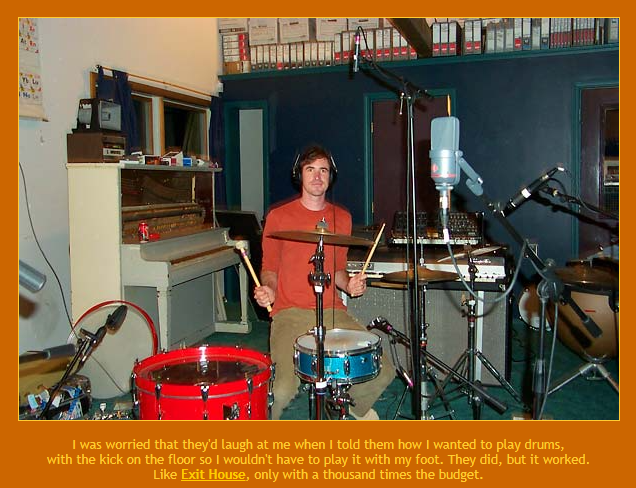Growing up in Chino, California, young Peter Hughes dreamed of writing for Car And Driver. By 13, he could modify a skateboard with hardware from his airline mechanic father's workbench, and produce a perfectly-proportioned watercolor of a Ferrari Daytona. But life had other plans, taking him offroad on a decades-long sojourn into music instead: from the raucous teenage improv of his high school band Exit House; to bedroom 4-tracking with a guitar and a Casio MT-100 as Party of One; to the ennui and rejection of his primary 90's songwriting project DiskothiQ, backed by his older brother and their friends; and finally, to solo work as Peter Peter Hughes.
1995 acoustic solo music by Peter Hughes.
In the 90's, Peter worked within the sprawling web of musicians stretching out from D.I.Y. label Shrimper Records. At Shrimper, record store owner and musician Dennis Callaci hand-dubbed and labeled cassettes for his own band Refrigerator, and for locals like Nothing Painted Blue, the Mountain Goats, and Wckr Spgt. Peter joined John Darnielle of the Mountain Goats for two European tours in 1996 (one fine; one legendarily bad) and contributed both guitar and accordion to Refrigerator's mid-90's double-exposure How You Continue Dreaming (1994) & Bicycle (1995). Starting in 1993, he picked up a steady gig as Nothing Painted Blue's third and longest-running bassist, learning how to work in studio environments and maximize the tour-vehicle potential of a Chevy Suburban. For a time he claimed Wckr Spgt's Everybody's Dead (Oh No) as the best record he'd played on, but he revised his answer after wrapping the sessions for 2004's We Shall All Be Healed. By then, he had settled into his new full-time job as the bassist for the Mountain Goats, formally, both in-studio and on tour.

Taken from Peter Hughes' tour photo diaries @ fivetools.com back when they still existed.
Peter's tenure with the Mountain Goats saw massive expansion in the band's sound, whether at the hands of early-aughts producer John Vanderslice, Superchunk powerhouse Jon Wurster at the drumkit, or multi-instrumentalist Matt Douglas. Records like 2017's moody, underhandedly funny Goths (which promised/threatened its lack of guitars in early promotional material) and 2022 thrasher Bleed Out (which, in the hands of Bully frontwoman and producer Alicia Bognanno, possibly features more electric guitar than all prior Mountain Goats records put together) are a far cry from the band's pivotal 4AD release The Sunset Tree and even further from 90's lower-fi outings like the Nine Black Poppies EP, which features Peter Hughes in an early cameo on "Cubs In Five." During his time with the Mountain Goats, Peter also picked up other work. Nothing Painted Blue released another album in 2006 after an 8-year hiatus, and Peter joined the recording sessions for Another, the 2012 release by Franklin Bruno's subsequent outfit The Human Hearts. In 2017, Peter's bass backed longtime friend John Davis (of indie-rockers The Folk Implosion) on El Pulpo, an album-length condemnation of imperial violence at its most polite: white-collar crime. Davis, a public school teacher, cites a number of academic texts in the album's liner notes. Alongside his musical peers enumerated here—teachers, librarians, novelists, lecturers, publishers, laywers—Peter Hughes made his way back to the written word in the 2010's and finally, formally, broke into automotive journalism.
Longtime Superchunk fan Peter Hughes also got to step in for touring bassist Jason Narducy for a festival show in 2018, teaming up with his rhythm-section partner Jon Wurster to back Mac McCaughan and Jim Wilbur.
Peter's final contribution to the Mountain Goats' discography was to play on 2023's Jenny From Thebes, and he toured with the band for another year after its release. On August 19th, 2024, Peter announced his retirement from the band, in both studio and touring capacities, after nearly three decades of creative collaboration.

Taken from Peter Hughes' Instagram, originally posted 8/19/2024 screencap 7/25/2025.
Not all of Peter's side work during his Mountain Goats years had him in the backing band. In 2010, Peter released Fangio, of which he says: "There's not a single note on that record that isn't me." Sung, played, and GarageBand-assembled as a solo effort, Fangio picks up more than one thread from Peter's days as Party of One. In college, Peter penned a Party of One song about legendary 1950's Formula One driver Juan Manuel Fangio driving a Saab 900 Turbo across the Andes to assassinate Augusto Pinochet. Fangio expands upon that idea and, with the aesthetics of Low-Life-era New Order and the refined political sensibilities of an older, angrier leftist, turns this imagined Fangio's gun on everyone who ever opened and drained the veins of Latin America: the CIA, the [people who manufactured the] cartels, the IMF, the WTO; the list goes on.
The music video for "My God Is An Angry God (Juan Manuel Fangio Castiga Los Pecados Del Mundo)" originally posted to YouTube by Davey G. Johnson (RIP) and starring Peter Hughes.
15 years later, the rage that animated Fangio and its violence, an imperial blowback of one, has not subsided. And after years of further solo explorations like "Everywhere, Forever" and "Suicide Cult" grappling with life in the imperial core, Peter Hughes has at last found a band of fellow travellers.

Back cover of the Fangio 7"; art by Marty Davis; scan by the author.
Which brings us to our next question: ------------->Who are Snowy and Pop Filter?------------->